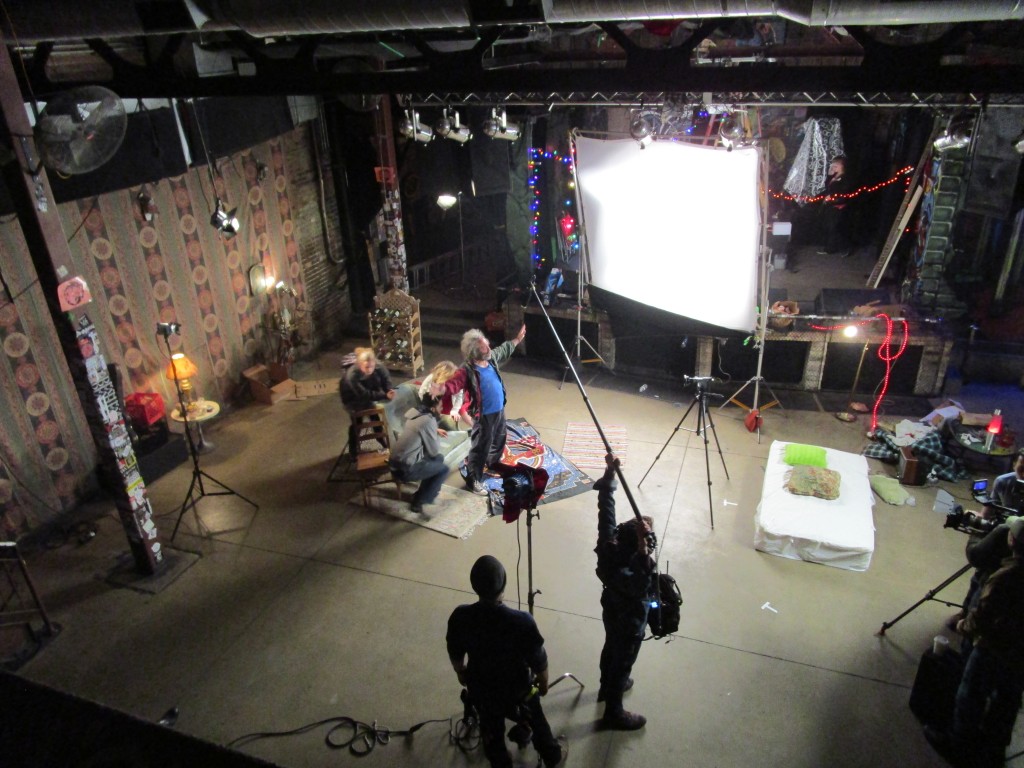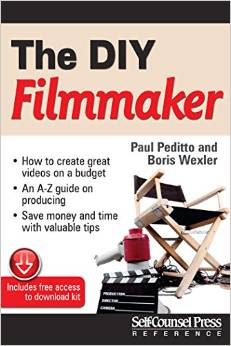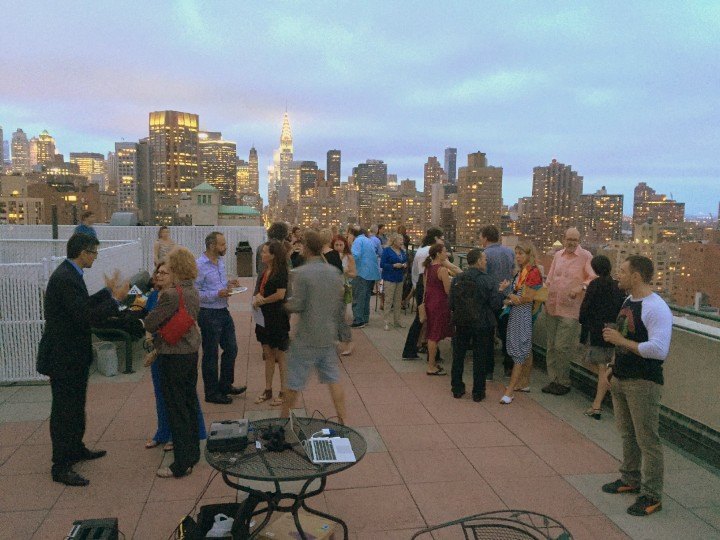
This week we’re going to look at the A to Z making of my second web series, Devolve. Hopefully you can learn from each stage of pre-production, production, and post. Vamos!
CASE STUDY: DEVOLVE
I got involved with Devolve in the summer of 2014 and helped produce it in late January, 2015. But let’s start at the end, at a rooftop party in New York July 4th, 2015 where we were launching episode one of Devolve. It was a risky strategy coming out on the holiday but we managed about 30,000+ hits for episode 1, not bad at all.
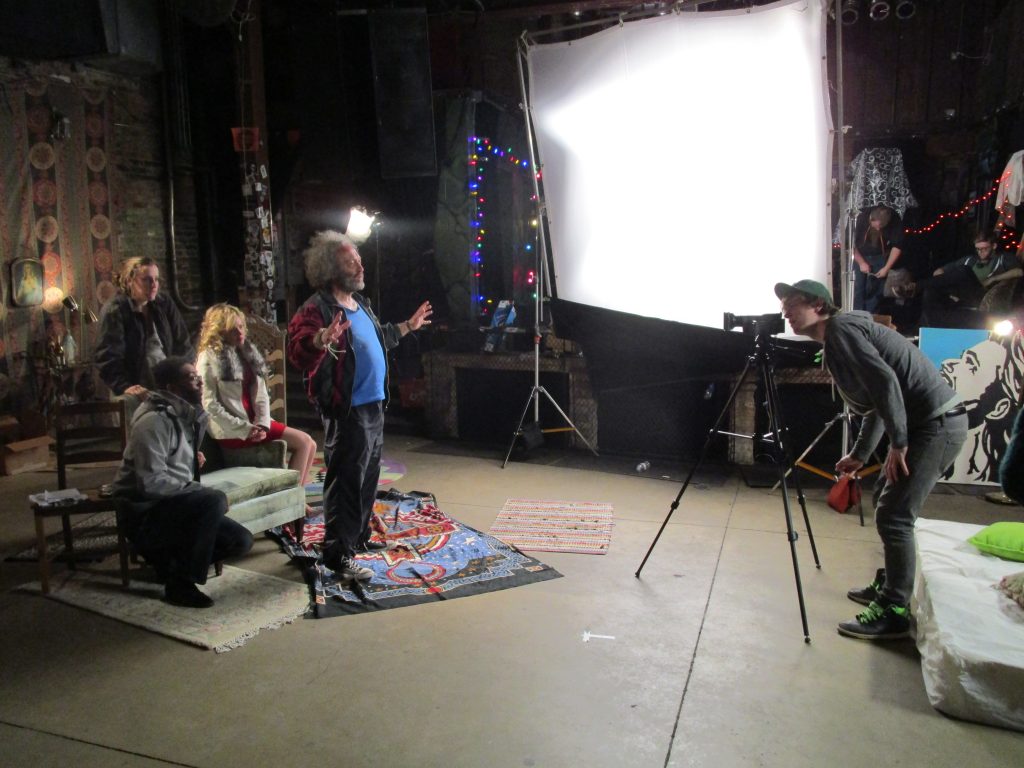
• BEGINNINGS
In March 2014, I gave a screenwriting seminar at Chicago Filmmakers. At that lecture was Dan Arthurs, a Chicago guy who braved ten below winds to listen to–lucky fellow!–five hours of me talking about screenwriting. Something must have clicked because within the month I heard from him and his partner, David Schwartz. Dan was writing a web series called Devolve. They wanted me involved. Write–direct–produce. And they could actually pay me a little something. Well, bless my mercenary soul, you’ve got my attention!
Dan was wrapping up the first draft, which would consist of five episodes. The page count was still being defined but the ideal budget was set. Without a locked script it was hard to get a firm grasp on what it would cost, so the first thing to do was nail the script down.
.
The original story was this: A group of twenty-somethings stumble upon Gold Almighty, who happens to be a hippy Stoner. They decide to document him changing a man into an Ape, “Devolving” him and proving Divine Existence, also making a s*&(load of money in the process. When they release the video of the miracle on YouTube, complications ensue.
By May and the script was still a work in progress. The early draft was set in a verdant field, placing God under a sort of Terrance Malick Tree Of Life. I reminded the guys that shooting in Chicago (as was the plan) we had until end of October to reasonably ask a crew to spend 12 hours outdoors. David wondered about alternatives and yes, even though Pixar in their 22 Lessons On Storytelling warns about never taking the first solution, the first thing that came to my mind was an arboretum. The guys liked it. If we couldn’t nail down the script and pre-production in time, we could go the arboretum route, shooting it into November or early December if necessary.
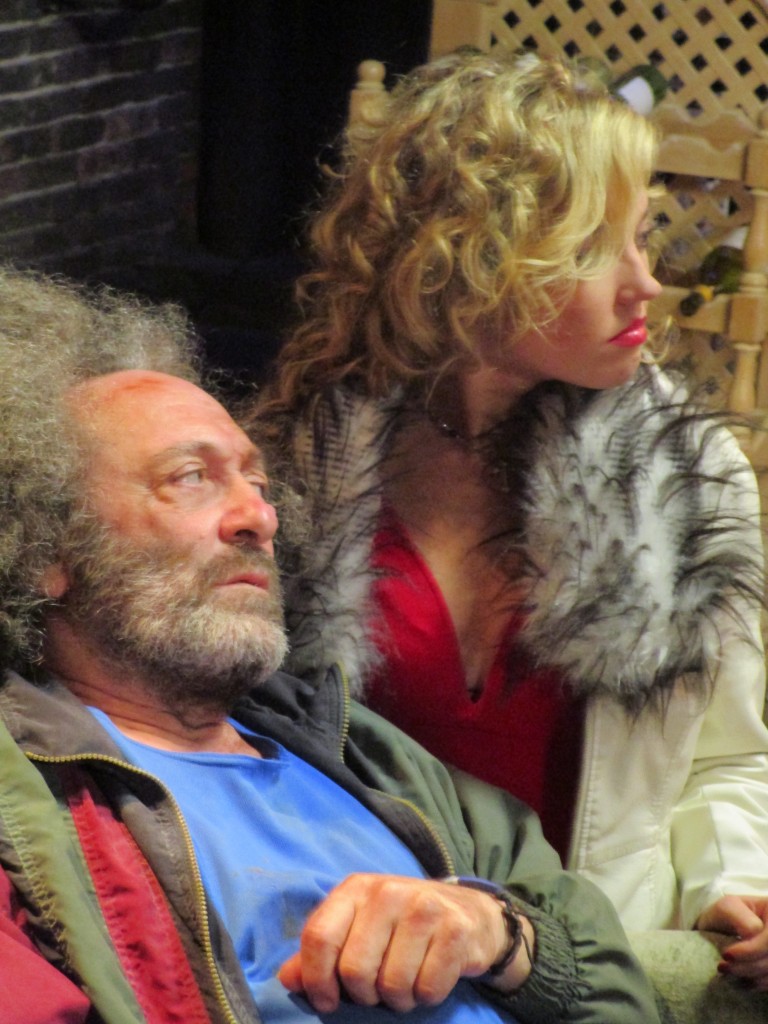
• SUMMER
The pressures of my Columbia classes changed the dynamic. I realized I would have to delegate duties. It was a no-brainer to ask my Chat. producing partner Boris Wexler to come in on this. Boris is 20X the producer I’ll ever be. Good Reader, if you learn anything from this course, learn to delegate responsibility. Boris would be lead producer. He would find us a kick-ass Line Producer(Jacqueline Jamjong), plus draw up the Scheduling and Budgeting documents. Oh, and one other thing– Fred Miller, ace DP who shot Chat, would come in at a discount. Boris pitched Fred who said sure, why not. Fred would bring the camera package and make a few calls for G&E crew. Things were coming together.
But the script was still a question mark. Dan and I passed the script back and forth trying to find a solution. What story were we trying to tell? And could we tell the story with the budget we had? We moved from a third draft to a fourth. We were into August now and the October shoot date was looking unlikely. Then, an idea…
I had a friend, Lizz Leiser, a sketch comedy writer working with her crew at Serious Theater Collective in New York. Maybe she could take the script to a better place. Here’s another life lesson, Good Reader: Adversity will happen. It’s how you respond to adversity that counts. No panic here. Get the script to Lizz, let’s see what she can do with it.
• FALL– LIZZ TO THE RESCUE!
By this time we had abandoned the Tree Of Life setting for God. Also the arboretum idea went by the wayside when we called the handful of local Chicago locations. Nobody was going to let a pack of twenty micro-budget web series types take over their lush gardens for a 12-hour shoot. So, now what? Boris had an idea– He knew from previous shoots that Reggie’s Rock Club was micro-budget friendly. A quick call, a friendly price quoted, and we had our space.
The beauty of Reggies? It had an upstairs bar that could double for the bar scenes. If you’re producing a web series on the cheap, try to limit company moves. Now with Reggies, we wouldn’t have to move, everything could be shot in one space. Now, what about that script?
We had reached the point of no return. We had already abandoned the pre-Christmas production dates. If we didn’t nail down the script soon, it would be impossible even to shoot in January. Lizz and her writing partner, Ricardo Delgado, sent back their first draft in early October. General rejoicing commenced! David and Dan loved her new take on the material. Lizz and Ricardo immediately took over the writing duties, polishing the first draft into a second and third. Meanwhile Jacquelyn and I got to work on casting.
Through Breakdown Express we got well over 100 actors to audition for the seven roles. Because the script was still in flux it was unclear if we were going SAG or NON-SAG. Our goal was to find the best actors possible. Dan joined us to help shoot the auditions and we put up the auditions on Vimeo for Boris and David to see. The beauty of working in Chicago on a comedy web series is the obscene amount of actors who rolled in with Improv training. We were literally up to our necks in funny people. The narrowing down of call backs would soon follow.
• WINTER- JOHN MOSSMAN TO THE RESCUE!
I had already given up my lead producer duties to Boris on budgeting and scheduling matters, and to Line Producer Jacquelyn J. on the day to day stuff. New teaching responsibilities now made it clear I wouldn’t be able to follow up with my Director responsibilities either.
What did I say was the key to producing? Knowing good people and delegating well. If I couldn’t see this through, who did I know in town who could? A handful of killer directing candidates were at the ready through Columbia College. I made a few calls and found out to our very great fortune that John Mossman was available. John is not just a long-time teacher at Columbia, he runs his own theater company (The Artistic Home) and is an actor himself! Dan and Dave interviewed Mossman and he became the director of Devolve. I was the only one at this point to know what an upgrade that was.
• JANUARY: PRE-PRODUCTION WRAPS
Three days in late January emerged as our production dates. All responsibilities were delegated–I was the Co-Producer who brought on Boris Wexler as lead Producer, John Mossman as Director, Lizz Leiser and her partner Ricardo as the writers. With Boris came killer Line Producer Jacquelyn J and some of our Chat crew including Fred Miller, our DP, also Sarah Sharp, our Production Designer and Make up artist. With Fred came the G&E crew. With Mossman and some of my Columbia friends came great people for Script Supervisor, AD, 2nd AD, and PA’s. See how this works? Who do you know? All links in a chain, one following the next. It’s why your professional reputation is so important. If people enjoy working with you, they will again on the next project. Be a jerkoff and see how fast that word gets around town.
So, the pre-production multi-tasking was popping. Director Mossman sat in on final auditions and quickly decided top choices for each role. Jacquelyn sent out offers. She also updated the Google docs for scheduling and worked with the AD on call sheets. A location scout was scheduled for Reggie’s Rock Bar so Production Designer Sharp and DP Fred Miller could get a sense of set and camera angles. Mossman and Miller worked up a shot list and overheads.
Meanwhile back in New York, Lizz and Ricardo were pounding on the script. These are primarily theater folk who, I think initially, were aghast at our absolute obsession over page count. Their first draft– 24 pages but not written on Final Draft so more like 30– was brilliant but had an unacceptable page count. The Boris equation for shooting pages per day is: five comfortably, six or seven pages pushing it, eight being Fantasyland, possibly doable but also possible you will NOT make your day. So yes, the script had to be pounded down. Subsequent drafts were 20 pages, then a last one at 17 pages, four episodes. We were now ready to shoot it.
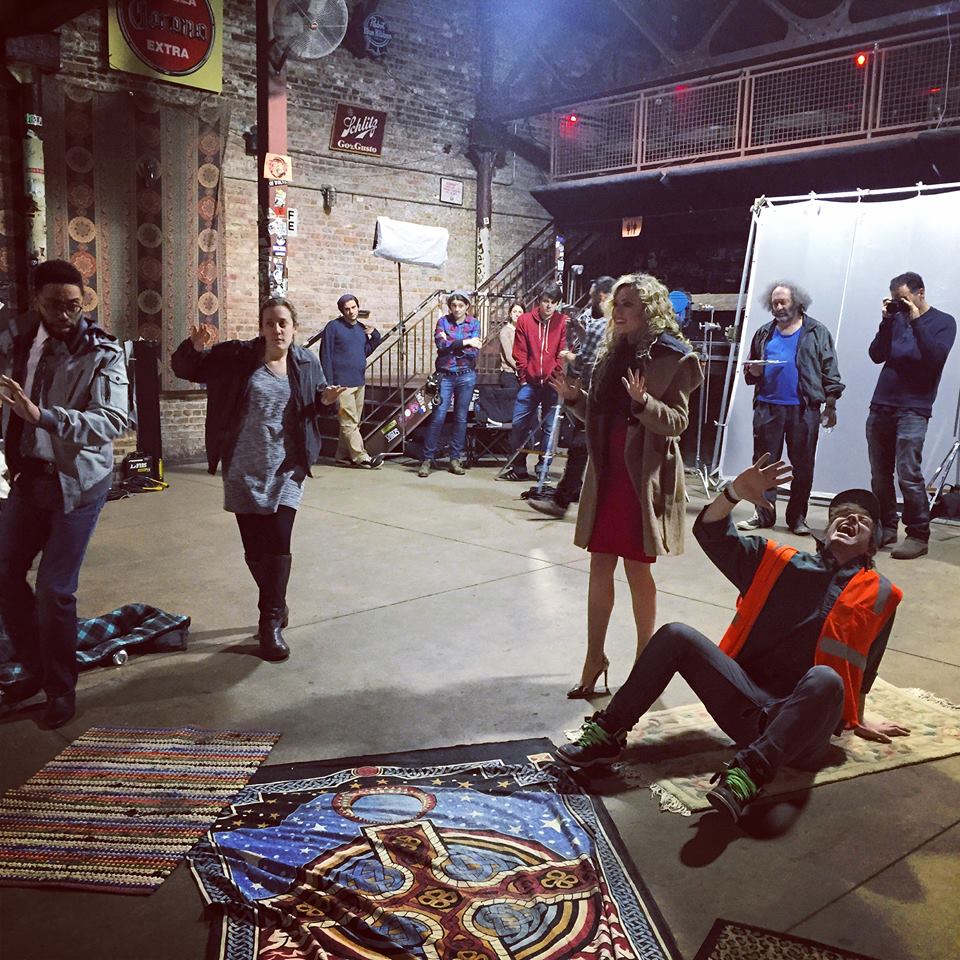
• PRODUCTION
Here is the Devolve budget on a spreadsheet, and in a PDF. You can also find these in the FILES area. Here’s a screenshot:
As we discussed in the budgeting chapter, look at the columns. Pay special attention to WHAT had to be paid for and HOW MUCH we paid. This was for a three-day shoot. If the money is coming out of your pocket, you have live and breathe the goal of spending nothing. And if you have to spend, spend the least amount possible.
You can minimize fees to ZERO for producer, writer, director, if all of them happen to be you. If you can’t wear every hat then you’ll need to find a combination of professionals who will work for less and students willing to work for the experience and credit. It’s absolutely doable and you shouldn’t feel intimidated. Are you connected in your film community? Take stock of who you can approach for each role. The goal: To pay the least humanly possible amount for quality people.
More specifically with Devolve, look at the columns…
See under MISC CAST…all six of our actors were SAG, so they received the $100 a day minimum (now $125) x 3 days = $1800 dollars. How about the DIRECTOR column, Do you want your director to be a student filmmaker who gets paid nothing? Sure, you can find some promising people, but it’s risky. We went with a pro in John Mossman, who gave us a good rate at $500 per day. These are the choices you have to make–pay the pro that $1,500 or wing it with a non-pro.
Who else HAS to get paid? Well, no one, if you have quality people that you know willing to throw you some charity. And if you don’t? The Producer and Line Producer have to get paid. There’s a SAG P&H. fee that has to get paid, also insurance. The DP has to get paid (yes, you can get a promising student for near free here, but do you want to risk it?) Lights may need to be rented. Gaffer and grips are paid, but not a ton. The sound people have to get paid. So do the art/makeup/hair departments. I know you didn’t forget that you have to feed everybody. And lastly, the contingency fund should any Acts Of God befall you during the shoot.
“Making your day” means you shoot everything you plan to shoot, in the time frame you plan to shoot it. Devolve made all three of its shooting days. The second day, in fact, we wrapped ahead of schedule. Getting every shot, multiple takes, ahead of time? Jacquelyn and I at one point remarked that it was too good to be true. Something was bound to mess up.
Day 3, last day of the shoot, the day I missed was the day the good luck dried up. Reggie’s Rock Bar isn’t a library. God Bless them, they are micro-budget friendly and anyone in Chicago looking for a club to shoot in has to look no further. Our first two days were scheduled from 3 a.m. to 3 p.m. The stage area is partitioned off from the bar area with metal doors which can be closed. So the first two days– though a couple bar patrons may have rolled in around 2pm– with the exception of the perpetual Chicago EL train thunder, there were no sound issues. That changed Day 3 when our shooting scheduled changed to 3pm to 3 a.m. We were now competing with 10X the bar patrons and, apparently, a crazed Lottery guy spinning his Big Wheel and instigating the audience to all manner of noise not conducive to the pillow soft quiet we needed to shoot our final scenes. Being as we weren’t filming Chicago Fire the crowd didn’t much care about how their noise was impacting our dinky web series. The crew soldiered on best they could. This is why God created ADR. Then Mossman called the Martini shot, and the thing was in the can!
Before we leave the subject of producing Devolve, here are a few more documents you may find useful when you shoot your own web series:
SHOT LIST:
This isn’t a directing course so I haven’t spoken much about the directing side, but we should make time for the shot list from Devolve, found here.
This is very much simplified. Just the location, shot number, type of shot (CU= Close Up, MCU= Medium Close Up, MS= Medium Shot, WS= Wide, Dolly= Dolly!) Another way to break down a shot list is to list the Scenes, then the different “set ups” (when the camera has to be moved). So for Scene 1, let’s say we’re doing a Master Wide Shot, then a Medium Close Up, then a Close Up. It would be:
1A- Wide
1B-MCU
1C-CU
It’s recommended you sit down with the DP and work this out ahead of time. It will save you money on set and make your day run smoother. Super basic, especially if you compare it to a PT Anderson shot breakdown. pro shot list.
OVERHEADS:
Camera placement is also broken down in overheads. Here’s a scan from the Devolve shoot from director John Mossman:
Actors are the letters, shots (that correspond with the shot list) are the numbers. We’re seeing HOW the shoot will go ahead of time. Never a bad idea when you’re burning through your OWN money to get this done!
CALL SHEET:
Here is a call sheet. The call sheet details on each day’s shooting including call times for cast and crew, the scenes to be shot that day, the length of each scene and which actors are required, and contact info for all.
DEVOLVE: POST-PRODUCTION: MARKETING
Dan and Dave did a fantastic job on marketing. Who would be interested in a web series about a Stoner God being videotaped performing a miracle? Here is their breakdown for social media and promotion:
Devolve
Social Marketing and Promotion Plan
Audience Engagement – people and groups to connect with
- Young and fun crowd – funny or die
- Christian Right
- Atheists
- Marijuana enthusiasts
- Web series – comedy
- Comedians
- College friends’ kids
- Crew and cast connections
Research
- Research and compile web series in our demographic
- Develop set of links to other web series on appropriate site (Delicious, StumbleUpon, or other) – goal is to have a definitive collection
- Best articles compiling top web series
- Research and compile information about web series in our demographic
- Statistics
- Release dates
- Film festival relevance
- Research and compile best teaser trailers for web series
- What really makes you want to see a web series?
- Big corporate web series
- Small, independent web series
- Identify and categorize web series and blogs
- Tactics
- Find Lists of web series on Twitter
- Create our own web series list on Twitter (try to get others to recognize and join)
- Types of content to identify
- Web sitcoms (like Devolve)
- Individual personality on webcam
- Cross-over shows (High Maintenance, The Guild, Children’s Hospital)
- Web talk shows (AOL channel, Snapchat, etc.)
- Review and memorialize what other successful series are doing
- SCTV
- High Maintenance – review press
- The Guild
- Others (?)
- Festivals
- Web series festivals
- online and live
- Major festivals – Sundance, Tribeca, etc.
- Web series festivals
- Tactics
Social Networking
- Help develop approaches to direct sharing with peers (viral marketing)!
- Email lists
- FB posts
- FB fan page
- Tie in to Chicago groups (?)
- Filmmakers
- Comedians
- SCTV
- Twitter
- Tweet helpful comments and questions about relevant audiences – develop wider following
- Connect with (Tweet and follow) web series that we like and respect
- Comedies primarily
- Others (action adventure, dramas, etc.)
- Form FB group for web series promotion
- Research existing FB groups
- get 10 web series members to join, each with 3 – 5 individuals;
- Promote and recruit for FB group
- FB Devolve FB Fan page
- Discuss when to promote – avoid clutter and noise
- Develop plan
- Importance of other platforms (?)
- Tumbler
PR – Promotion
- John Mossman appearances
- Podcasts
- Groups/organizations
- Web show
Content Development
- Develop guest blog post on the web series landscape
- Add clarity to conversation;
- Research best venue for guest blog post(s)
- Pot magazine blog (High Times)
- Web series blog/publication
Direct Outreach – Dan and David
- Funny or Die
- Other outlets
- High Times editor
WHAT HAPPENED WITH DEVOLVE?
If you try to Google Devolve, all you’ll get is the trailer. There’s a reason for this. As I said, the first episode of Devolve did quite well, with over 30,000 hits. It was promising enough that Dan and Dave decided to take the unique step of packaging the 4 episodes together, and editing them into a single 15 minute short film. In recent years they played the festival circuit with Devolve.
So, Good Reader, now that you know all this, go and do likewise!
